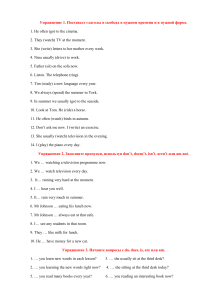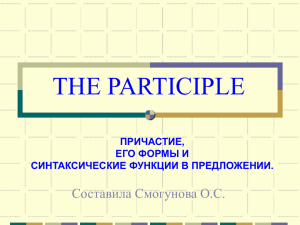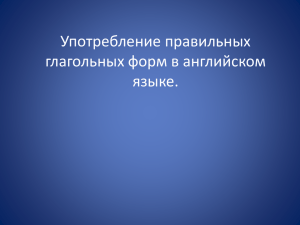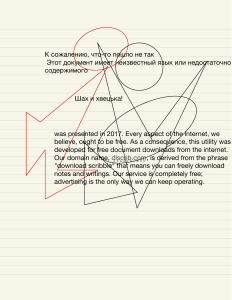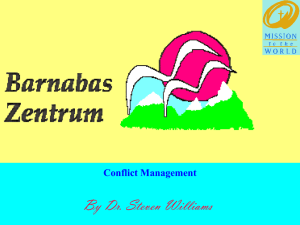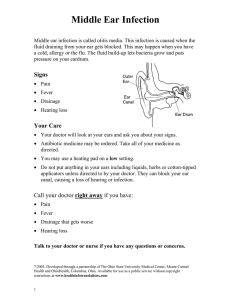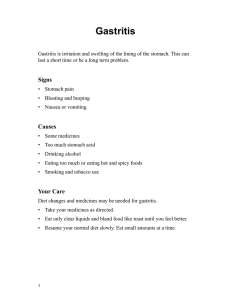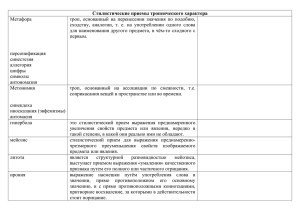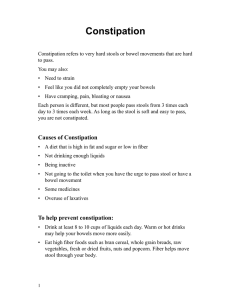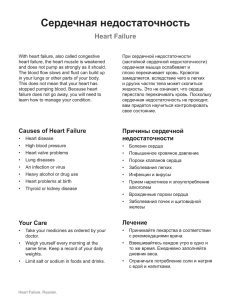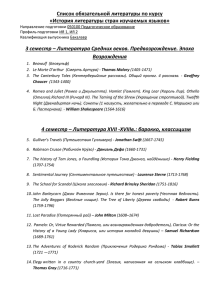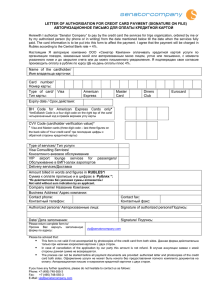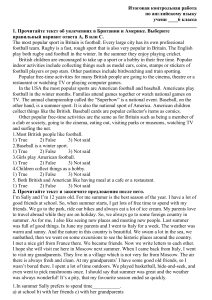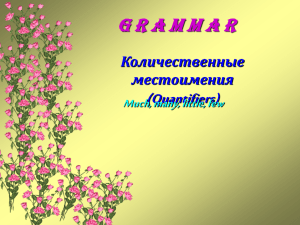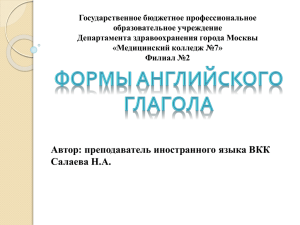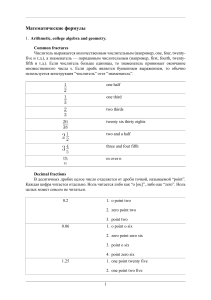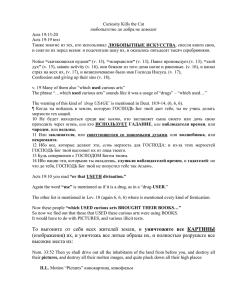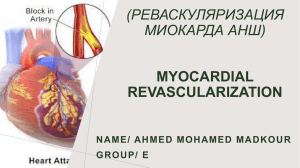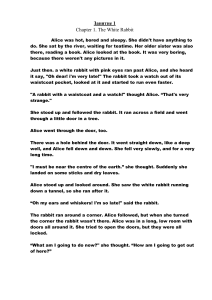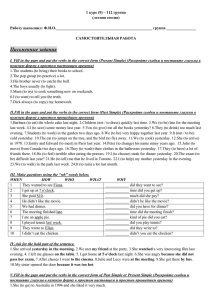PARTICIPLE (ПРИЧАСТИЕ) Причастие – это неличная форма
advertisement
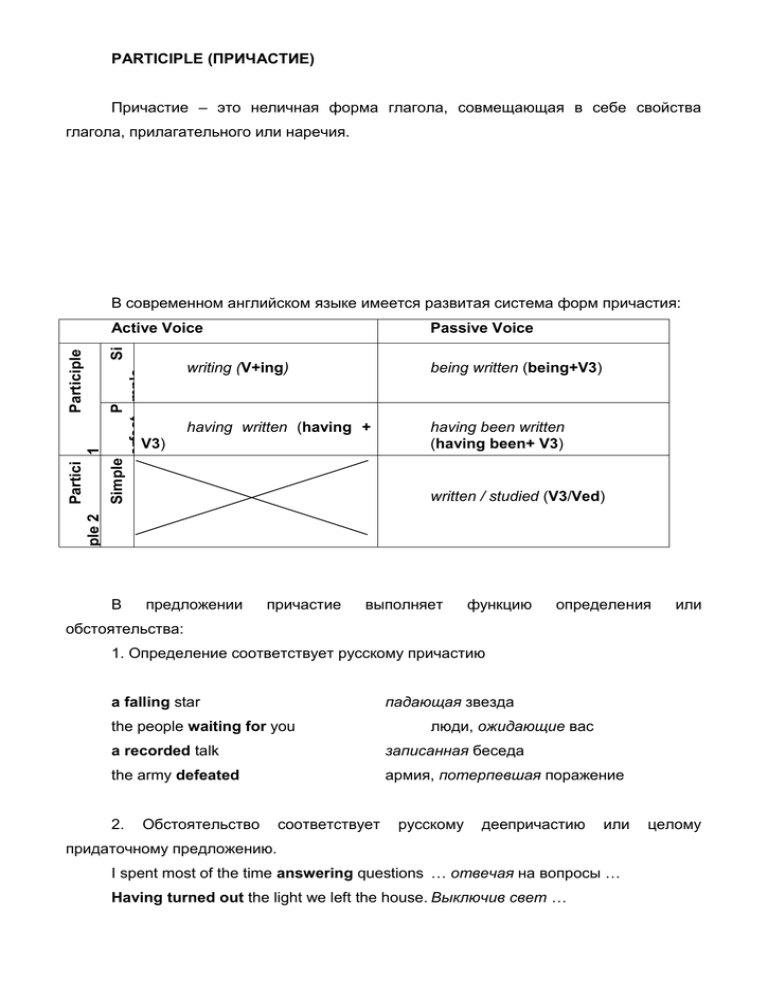
PARTICIPLE (ПРИЧАСТИЕ) Причастие – это неличная форма глагола, совмещающая в себе свойства глагола, прилагательного или наречия. В современном английском языке имеется развитая система форм причастия: Passive Voice mple writing (V+ing) being written (being+V3) erfect having written (having + having been written (having been+ V3) P Participle Si Active Voice written / studied (V3/Ved) ple 2 Partici Simple 1 V3) В предложении причастие выполняет функцию определения или обстоятельства: 1. Определение соответствует русскому причастию падающая звезда a falling star the people waiting for you люди, ожидающие вас a recorded talk записанная беседа the army defeated армия, потерпевшая поражение 2. Обстоятельство соответствует русскому деепричастию или придаточному предложению. I spent most of the time answering questions … отвечая на вопросы … Having turned out the light we left the house. Выключив свет … целому Well done the device will function properly. Если устройство хорошо выполнено … When arranged the elements exhibited … При соответствующем расположении… Причастие I (перфектная форма) выполняет единственную синтаксическую функцию обстоятельства и соответствует русскому деепричастию или придаточному предложению. Получив телеграмму, я Having received the telegram I answered it at once. … Having been given due attention После того как этой проблеме уделили должное внимание, the problem was successfully solved. она была успешно решена. Сравните причастия: She’s annoyed – Она раздражена (окончание –ed описывает чувства кого-либо). The noise is annoying – Этот шум раздражающий (окончание –ing описывает что-либо или кого-либо, который вызывает эти чувства). I’m interested in photography – Я интересуюсь фотографированием. I think photography is interesting – Я думаю фотографирование интересное дело. Упражнение 1. Прочитайте разговор между Мартином и Луизой об их друге Алисе. Обведите правильную форму причастия в тексте разговора. Martin: What’s the matter with Alice? Louise: Who knows? She’s always (1) annoyed / annoying about something. Martin: I know. I try to understand her but this time I’m really (2) puzzled / puzzling. Louise: Really? What’s so (3) puzzled / puzzling this time? Martin: I thought she was happy. She met an (4) interested / interesting guy last week. Louise: That’s nice. Was she (5) interested / interesting in him? Martin: I thought she was. She said they saw a (6) fascinated / fascinating film together. Louise: Well, maybe she was (7) fascinated / fascinating by the film but (8) disappointed / disappointing with the guy. Martin: I don’t know. It’s hard to tell with Alice. Her moods are always very (9) surprised / surprising. Louise: I’m not (10) surprised / surprising at all. That’s just the way she is. Упражнение 2. Прочитайте разговор между Алисой и ее другом Джейком. Дополните предложения соответствующей формой причастия, раскрыв скобки. Alice: That was a very (1) _________ (interest) film. What did you think? Jake: To be honest, I found it rather (2) _________ (bore). I’m not that (3) __________ (interest) in science fiction. Alice: Really? I find it (4) _________ (fascinate). What kind f films do you enjoy? Jake: Mostly comedies. Have you seen Home Again? Alice: Yes, but I wasn’t (5) _________ (amuse) at all. In fact, I thought it was (6) _________ (horrify). The story line was (7) _________ (confuse) and I couldn’t find any humor in the character’s problems. When I left the cinema, I felt kind of (8) __________ (depress). Jake: I’m (9) ________ (amaze) that you felt that way! I thought it was very (10) _________ (amuse). Упражнение 3. Выберите форму причастия (A-G) соответствующую содержанию каждого предложения. Один вариант ответа лишний. A giving B not having been given E being given 1. C not giving F having given D having been given G given The best part … to another actor, Josh felt unwilling to continue his involvement in the show. 2. I’ve always treasured the watch … to me on my eighteenth birthday. 3. The police officers stood at either end of the hallway, … Ray no chance to escape. 4. … our tickets to the attendant, we were ushered into the antechamber of the 5. We are dividing up the grant according to need, the largest amount … to the tomb. homeless. 6. in the house. … the mandatory month’s notice by the landlord, the tenant was able to stay on Упражнение 4. Переведите на английский язык слова в скобках причастием I или причастием II: 1. Her portrait (нарисованный) by a great artist in Montmartre was hung in the sitting room. 2. We had a farewell class party in a new riverside restaurant (открытым) last month. 3. The person (писавший) this letter was very excited. 4. Mr. Adams gave us a (удивленный) look. 5. Customers (покупающие) things at their shop today are given small gifts. 6. They were sitting around the fire telling (устрашающие) stories about ghosts and monsters. 7. Things (оставленные) outside are not taken care of. 8. The man (показывающий) the road looks like the robber the police is searching. 9. Without speaking she struck both the attackers a (удивительный) blow on the head with her handbag and walked away. 10. He didn’t very much like his work at the agency (рекламирующем) cigarettes. 11. Most of the films (показываемые) on TV leave much to be desired. 12. Things (купленные) in the open air market places can’t be returned or exchanged. 13. The chairman (открывающий) the conference said a few words of greeting. 14. The artist (рисующий) this portrait didn’t know it was to be a recognized masterpiece. 15. Do you believe that (рекламируемые) goods are in demand? 16. All passengers (проводящие) the night at the airport through the fault of the Company will be provided with sleeping facilities. Spain. 17. This article (написанная) ten years ago hasn’t lost its significance. 18. The girl (оставляющая) the message said it was urgent. 19. The (испуганный) kitten climbed up the tree and couldn’t get down. 20. Alice said she would never forget the wonderful holiday (проведенные) in
